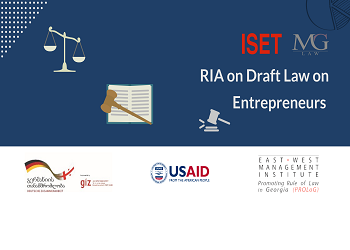- Details
People face complicated financial decisions starting from a young age. Financial mistakes made early in life can be costly. Thus, Financial literacy could play an important role in sound financial decision-making. Financial illiteracy has implications for many household behaviors. People with the lack of financial literacy participate less in the stock market (van Rooij et al. 2011), choose mutual funds with higher fees (Hastings and Tejeda- Ashton, 2008), and accumulate less retirement wealth (Behrman et al. 2010). There is also evidence that the less literate people are more likely to have costly mortgages (Moore, 2003) and more likely to engage in highcost borrowing.
- Details
Policy context. In 2013, as a follow-up to public consultations on improving the acting company law in Georgia, a working group was established to elaborate a new Draft Law of Georgia on Entrepreneurs (“Draft Law”). The working group was created under the Private Law Reform Council of the Ministry of Justice of Georgia, the USAID-funded Judicial Independence and Legal Empowerment Project, which was succeeded by the Promoting Rule of Law in Georgia (PROLoG) Activity, with both projects implemented by the East-West Management Institute (EWMI), was a cooperating partner. The group was comprised of Georgian academics and legal practitioners. International experts provided consultations.












